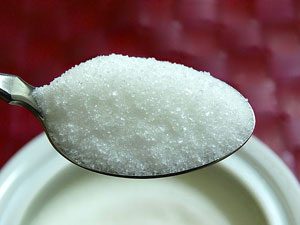 It seems obvious to many of us that increasing consumption of sugar can cause weight gain. But many of the dietary sources of sugar are hidden.
It seems obvious to many of us that increasing consumption of sugar can cause weight gain. But many of the dietary sources of sugar are hidden.
We all know that regular soda, cookies and candy contain large quantities of sugar. What is surprising is that about 75% of all processed foods and beverages contain some kind of added sugar.
Recommendations to Cut Sugar Consumption
Studies have linked high consumption of sugar-sweetened beverages with an increased risk of obesity in children. And now, there is also scientific research showing that “decreasing sugar consumption has a small but meaningful impact on body weight in adults.”
The finding, published online in the BMJ, showed that although the impact may be small, sugar consumption should be cut to less than 10 percent of total calories to help stem the worldwide obesity epidemic.
One possible reason the impact on weight loss was not greater is that the eliminated sugar may have been replaced to some extent by other refined carbohydrates.
The mounting evidence against excess sugar consumption as a contributor to the obesity epidemic has led to efforts to reduce sugar-sweetened beverages, including limits on soda portion sizes sold in New York City (other cities may follow) and the recent debate on taxing soda in Philadelphia. Sugar-sweetened drinks have already been removed from many schools.
In response to all of the negative publicity, Coca-Cola has begun a global advertising campaign, reminding people that the company offers low calorie products, and that weight gain comes from consuming too many calories in general, not just from drinking soda. Whether this ad campaign can counter the growing public awareness of the problems associated with soda remains to be seen.
Research Updates on Sugar & Obesity
The so-called “Australian Paradox” study was published in 2013. It showed that although Australians greatly reduced their sugar consumption between 1980 and 2010, their rate of obesity actually tripled!
Researchers at the University of Michigan have found that muscles can sense glucose, and play a role in regulating the body’s blood sugar levels.
In “The Case Against Sugar” author Gary Taubes lays out the research connecting sugar to a variety of harmful health effects.
It has also been revealed that processed food manufacturers, including the soda and breakfast cereal companies, have spent millions of dollars to undermine scientific and government claims that sugar is harmful. Some people have compared these efforts to those of the tobacco companies some years ago.
It’s becoming obvious that obesity is a very complex issue that we don’t completely understand. There is probably not one single cause for the current obesity epidemic, and we will have to address this issue on many fronts simultaneously.
